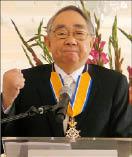Evergreen Group (長榮集團) chairman Chang Yung-fa (張榮發) was awarded a royal medal by the Netherlands on Sunday for his contribution to the world economy, becoming the first Taiwanese to receive the honor from the country.
Chang, who runs one of the world’s biggest shipping companies, was presented with the Commander of the Order of -Orange-Nassau by Rotterdam Mayor Ahmed Aboutaleb, on behalf of Queen Beatrix.
“I am determined,” Chang said at the award ceremony.

Photo: CNA
Chang, who is now in his 80s, founded the conglomerate in 1968 to offer shipping, transportation and related services. He now chairs a multinational corporation that owns more than 180 container ships and 60 passenger planes.
He said that more than 30 years ago, it was nearly an impossible task for Evergreen Marine Corp (長榮海運) to break into the European market, which was monopolized by the members of the Far Eastern Freight Conference.
However, Chang said, he did not back down in the face of competition, but instead overcame the obstacles and launched European operations in 1979 at the Port of Rotterdam — one of the world’s busiest container seaports.
At the presentation ceremony, Aboutaleb said the Evergreen conglomerate has played an integral role in boosting the economic development of Rotterdam and the rest of the world.
Chang presented Aboutaleb with a delicate piece of Taiwanese handicraft that featured a painting by Dutch artist Vincent van Gogh.
The Netherlands award follows similar honors granted to Chang by Belgium, France, Italy, Malaysia, Panama and the UK in recognition of his achievements in the field of marine transportation.

Sweeping policy changes under US Secretary of Health and Human Services Robert F. Kennedy Jr are having a chilling effect on vaccine makers as anti-vaccine rhetoric has turned into concrete changes in inoculation schedules and recommendations, investors and executives said. The administration of US President Donald Trump has in the past year upended vaccine recommendations, with the country last month ending its longstanding guidance that all children receive inoculations against flu, hepatitis A and other diseases. The unprecedented changes have led to diminished vaccine usage, hurt the investment case for some biotechs, and created a drag that would likely dent revenues and

Global semiconductor stocks advanced yesterday, as comments by Nvidia Corp chief executive officer Jensen Huang (黃仁勳) at Davos, Switzerland, helped reinforce investor enthusiasm for artificial intelligence (AI). Samsung Electronics Co gained as much as 5 percent to an all-time high, helping drive South Korea’s benchmark KOSPI above 5,000 for the first time. That came after the Philadelphia Semiconductor Index rose more than 3 percent to a fresh record on Wednesday, with a boost from Nvidia. The gains came amid broad risk-on trade after US President Donald Trump withdrew his threat of tariffs on some European nations over backing for Greenland. Huang further

Macronix International Co (旺宏), the world’s biggest NOR flash memory supplier, yesterday said it would spend NT$22 billion (US$699.1 million) on capacity expansion this year to increase its production of mid-to-low-density memory chips as the world’s major memorychip suppliers are phasing out the market. The company said its planned capital expenditures are about 11 times higher than the NT$1.8 billion it spent on new facilities and equipment last year. A majority of this year’s outlay would be allocated to step up capacity of multi-level cell (MLC) NAND flash memory chips, which are used in embedded multimedia cards (eMMC), a managed

CULPRITS: Factors that affected the slip included falling global crude oil prices, wait-and-see consumer attitudes due to US tariffs and a different Lunar New Year holiday schedule Taiwan’s retail sales ended a nine-year growth streak last year, slipping 0.2 percent from a year earlier as uncertainty over US tariff policies affected demand for durable goods, data released on Friday by the Ministry of Economic Affairs showed. Last year’s retail sales totaled NT$4.84 trillion (US$153.27 billion), down about NT$9.5 billion, or 0.2 percent, from 2024. Despite the decline, the figure was still the second-highest annual sales total on record. Ministry statistics department deputy head Chen Yu-fang (陳玉芳) said sales of cars, motorcycles and related products, which accounted for 17.4 percent of total retail rales last year, fell NT$68.1 billion, or